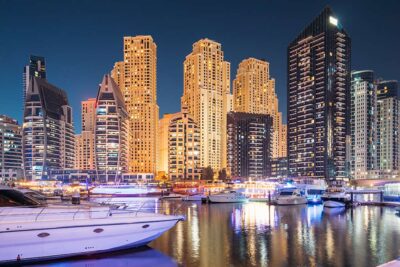
Everything You Need to Know About Investing in Dubai Real Estate
Dubai stands as a global cultural hub, known for its world-class infrastructure, cutting-edge urban planning, and unmatched connectivity. The city’s rapidly growing economy offers a wealth of investment opportunities, particularly in the flourishing real estate market.
In 2021, Dubai saw the highest number of real estate transactions in over a decade, with the luxury property market becoming an increasingly attractive sector. Dubai’s competitive property prices are comparable to those in major international cities like London, Singapore, Paris, Hong Kong, and New York.
Why Invest in Dubai Real Estate?
Dubai is one of the top cities for property investment, offering several advantages such as a luxurious lifestyle, year-round sunshine, low crime rates, and exceptional global connectivity. The city’s cultural diversity makes it easy for foreigners to acclimate and thrive.
With countless options available, choosing the right property can be overwhelming. It’s important to know what you’re looking for and to avoid common mistakes when selecting an investment.
Before diving into Dubai’s real estate market, conducting thorough research and analysis is essential. Consider factors like market trends, risks, and your financial capability to ensure you have a structured and well-informed investment strategy.
Property Finder, a leading platform, is here to guide you through the process. Mohamed Kaswani, Managing Director of Mortgage Finder, a premier mortgage advisory firm in the UAE, offers valuable insights for prospective investors.
Key Factors to Consider When Investing in Dubai
- Location: The location of your property can significantly impact your investment’s success. Areas with high demand and accessibility to attractions are highly desirable. Dubai is a global shopping hub, with residents drawn to areas near prominent malls like Dubai Mall and Mall of the Emirates. Communities like Downtown Dubai, Al Barsha, Dubai Marina, and Palm Jumeirah are especially popular. Other frequently searched areas include Nad Al Sheba, Oud Metha, Jumeirah Lake Towers, and Dubai Hills.
- Short-term vs Long-term Rentals: Different properties perform better with varying rental strategies. Apartments in Downtown Dubai, Palm Jumeirah, and Dubai Marina are ideal for short-term leases, while villas in Dubai Hills, Jumeirah Park, and JVT offer better returns on long-term leases.
- Cash vs Finance: Assess cash-on-cash returns and consider using leverage to maximize your investment.
- Service Charges and Management Fees: These costs vary between properties and should be factored into your investment calculations.
Off-plan vs Ready-to-move Properties
When investing in Dubai, you can choose between off-plan properties (under construction) or ready-to-move units. Here’s a breakdown of the pros and cons:
Off-plan Properties:
- Pros:
- Typically lower prices than ready properties
- Reputable developers add significant value as communities mature
- Lower down payments
- Attractive interest-free payment plans that allow investors to manage cash flow
- Cons:
- Market fluctuations can affect property value
- Risks of project delays or cancellations
Ready-to-move Properties:
- Pros:
- Immediate rental income
- Buyers can inspect the property before purchase
- Cons:
- Higher upfront investment
- Less flexibility in payment plans
Freehold vs Leasehold Ownership
Understanding ownership types is crucial when buying property in Dubai.
- Freehold: Buyers gain full ownership of the property with the right to use, lease, or sell it.
- Leasehold: Buyers own the property for a specified period (usually up to 99 years) but do not have full ownership rights.
Key Considerations When Buying Property in Dubai
- Account for Additional Costs: Keep in mind the closing costs, service charges, agent fees, Dubai Land Department fees, mortgage fees, and property management fees when calculating the net yield of your property.
- Focus on Numbers, Not Emotions: Investment properties are all about returns, not personal preference. Even if you don’t love the property or neighborhood, if it provides a good yield, it’s a wise investment.
Top Areas to Invest in Dubai
Dubai’s real estate market is always evolving, meaning investment returns can change over time. Waterfront properties, in particular, are consistently in demand. As Mohamed Kaswani advises, “There are pockets of neighborhoods that are selling at good value. Compare price per square foot in nearby neighborhoods to get the best deal.”
Can Foreigners Invest in Dubai?
Yes, foreign nationals can invest in freehold areas, granting full ownership rights, or leasehold properties, where ownership is time-bound (usually 99 years). This applies to both expats living in the UAE and non-residents.
What Is an Investment Visa?
Dubai offers an investment visa for non-residents looking to invest in real estate. To qualify:
- The property must be worth at least AED 1 million.
- Up to 50% of the property can be under mortgage.
- Each investor’s share must be at least AED 1 million when purchasing with a partner.
- The property must not be off-plan or leasehold to qualify.
Tips for Success After Investing in Dubai
Once you’ve secured your property in Dubai, here are some tips to maximize your investment:
- Hire a reputable property management company
- Request real-time reporting
- Treat your tenants well
- Offer quarterly payment options to attract more tenants
How Property Finder Can Help You
Property Finder offers insights and data to help you make well-informed real estate decisions. You can use the platform to find the best properties, compare areas, and, once you’re ready, list your property with trusted agents to attract tenants quickly.
Avoid listing with multiple agents, as this can devalue your property. Instead, choose community experts and Super Agents who know your neighborhood well.